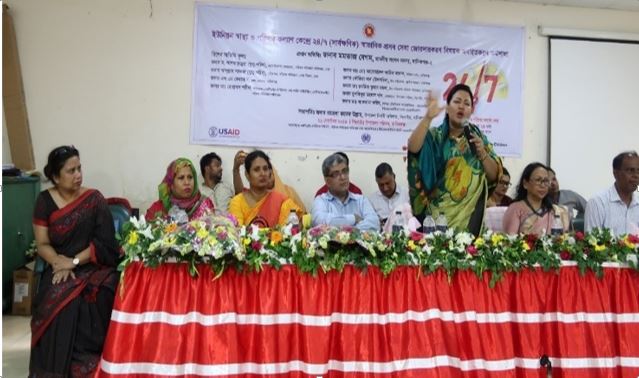|
Project name: USAID’s MaMoni Maternal and Newborn Care Strengthening Project (MaMoni MNCSP)
Project period: 26 April 2018 to 25 April 2023
Donor: USAID
Consortium partners: BSMMU, IHI, Jhpiego, COHSASA, icddr,b, Dnet, PHD
Managed by: Save the Children
Project location:
17 Districts (Brahmanbaria, Habiganj, Manikganj, Chandpur, Lakshmipur, Feni, Noakhali, Faridpur, Madaripur, Kushtia,
Cox's, Bazar, Netrakona, Sunamganj,
Sylhet, Bandarban, Chattogram Sandwip, Mymensingh and Shariatpur)
|

|
Project overview:
Save the Children and the consortium partners work to advance learning, expand and scale up effective maternal and newborn care (MNC) interventions to substantially improve health outcomes for mothers and newborns in Bangladesh. The project supports the 4thHealth, Population and Nutrition Sector Program (HPNSP) of Bangladesh to achieve its goals of significantly reducing maternal and neonatal mortality by 2022. The project’s strategic objective of increased equitable utilization of quality maternal and newborn care services. Key outcomes will be achieved through four closely linked Intermediate Results (IRs) to advance health system responsiveness, MNC service quality and governance, access and demand for services and healthy household practices, and national capacity to deliver these services with quality at scale. In addition, the project will expand the evidence base and test new MNC innovations in selected learning sites and facilitate health systems improvements and policy changes for sustained impact at national scale.
|
|
Role of PHD:
As a technical consortium partner PHD is playing a key role to the following thematic area specific capacity building of partner NGOs and facilitate strategic directions across the several systems to bring collective expertise in policy advocacy.
- Establish functional Social Accountability: Towards improving responsiveness of health systems to deliver patient-centered MNC Services PHD would initiate an approach to establish Social Accountability (SA) that relies on civic engagement where citizens participate directly or indirectly in demanding services from the service providers.
- Mobilize local government and accountability: PHD would facilitate an innovative process in engaging Local Government Institutions (LGIs) in local health system and mobilize monetary and nonmonetary local resources for sustainable improvement of MNC service and household (HH) Practices.
- Engagement and coordination of community groups: PHD would provide strategic direction and technical assistance to the Implementing Partners for improving coordination between existing community cadres and public sectors. PHD would also initiate national level advocacy to accumulate local level lessons learned.
- Reduction of Access barrier: Considering the geographical clusters, communication barrier, socio-economic obstacles, inaccessibility of services, seasonal limitation and the like, PHD would facilitate developing alternative service delivery strategies and approaches to reduce access barriers and establish MNC health services at the Hard to Reach (HtR) and Underserved areas.
|
|
Major achievements:
- Engaged facility management committee (FMG) and community support committee (CSC) establishing a Social Accountability mechanism in the pilot areas where client feedback on quality health services is addressed.
- Mobilized local resources through an innovative process where LGIs and communities are engaged. Through their active participation and contribution, at the union level, the number of upgraded facilities (24/7 UH&FWC) increased up to 80% (472).
- Director General Family Planning (DGFP) recognized the local resource mobilization model and scale up in new areas.
- An advocacy initiative with the National Institute of Local Government (NILG) has helped in including a session: ‘Role of Union Parishad (UP) to strengthen MNC services’ in UP training manual.
- Activated Community Groups (CG) and Community Support Groups (CSG) through community micro-planning, facilitating front line Ministry of Health (MOH) workers such as Health Assistants (HA), Community Health Care Providers (CHCP), Family Welfare Assistants (FWA), Community Health Workers (CHW) resulting in increased registration of pregnant women (PW) and newborns and build coordination among the public, private and NGO sectors.
- Underserved union Identified and prioritized through assessment and physical verification, and pilot MNH services initiated at the Hard to Reach and underserved areas.
|
|
